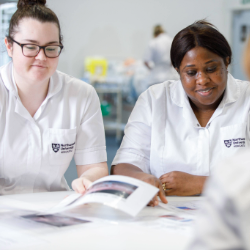-
Study
-
Undergraduate
- UCAS Clearing & Confirmation 2025
- Application Guides
- UCAS Exhibitions
- Foundation Years
- School & College Outreach
- Information for Parents
-
Postgraduate
- Application Guide
- Postgraduate Research Degrees
- Flexible Learning
- Change Direction
- Register your Interest
-
Student Life
- Students' Union
- The Hub - Student Blog
- Accommodation
- Northumbria Sport
- Support for Students
-
Learning Experience
- Real-World Learning
- Research-enriched learning
- Graduate Futures
- The Business Clinic
- Study Abroad
-
-
International
International
Northumbria’s global footprint touches every continent across the world, through our global partnerships across 17 institutions in 10 countries, to our 277,000 strong alumni community and 150 recruitment partners – we prepare our students for the challenges of tomorrow. Discover more about how to join Northumbria’s global family or our partnerships.
View our Global Footprint-
Quick Links
- Course Search
- Undergraduate Study
- Postgraduate Study
- Information for Parents
- London Campus
- Northumbria Pathway
- Cost of Living
- Sign up for Information
-
International Students
- Information for International Students
- International Events
- Application Guide
- Entry Requirements and Education Country Agents
- Global Offices
- English Requirements
- English Language Centre
- International student support
- Cost of Living
-
International Fees and Funding
- International Undergraduate Fees
- International Undergraduate Funding
- International Masters Fees
- International Masters Funding
- International Postgraduate Research Fees
- International Postgraduate Research Funding
-
International Partners
- Agent and Representatives Network
- Global Partnerships
- Global Community
-
International Mobility
- Study Abroad
- Information for Incoming Exchange Students
-
-
Business
Business
The world is changing faster than ever before. The future is there to be won by organisations who find ways to turn today's possibilities into tomorrows competitive edge. In a connected world, collaboration can be the key to success.
More on our Business Services -
Research
Research
Northumbria is a research-rich, business-focused, professional university with a global reputation for academic quality. We conduct ground-breaking research that is responsive to the science & technology, health & well being, economic and social and arts & cultural needs for the communities
Discover more about our Research-
Quick Links
- Research Peaks of Excellence
- Academic Departments
- Research Staff
- Postgraduate Research Studentships
- Research Events
-
Research at Northumbria
- Interdisciplinary Research Themes
- Research Impact
- REF
- Partners and Collaborators
-
Support for Researchers
- Research and Innovation Services Staff
- Researcher Development and Training
- Ethics, Integrity, and Trusted Research
- University Library
- Vice Chancellors Fellows
-
Research Degrees
- Postgraduate Research Overview
- Doctoral Training Partnerships and Centres
- Academic Departments
-
Research Culture
- Research Culture
- Research Culture Action Plan
- Concordats and Commitments
-
-
About Us
-
About Northumbria
- Our Strategy
- Our Staff
- Our Schools
- Place and Partnerships
- Leadership & Governance
- University Services
- History of Northumbria
- Contact us
- Online Shop
-
-
Alumni
Alumni
Northumbria University is renowned for the calibre of its business-ready graduates. Our alumni network has over 250,000 graduates based in 178 countries worldwide in a range of sectors, our alumni are making a real impact on the world.
Our Alumni - Work For Us
What will I learn on this module?
You will learn about various Neuroscience Disorders by exploring the cause(s), anatomy and physiology of a disorder, the rationale for tests
in assisting in the diagnosis of a disorder, as well as application and ethics associated to treatment of a disorder. Topics that may be covered
include;
• Inherited neurological disorders and genetic
selection
• Movement disorders
• Neuromuscular problems
• Sensory and/or motor disorders
• ANS disorders
• Memory loss
• Spinal Cord Injury
• Rehabilitation.
How will I learn on this module?
You will learn through investigating a series of neuroscience disorders/problems in a Problem Based Learning (PBL) format, working as part
of a group of 5 to 6 students. The series will be composed of 5 neuroscience scenarios with each scenario being addressed over two weeks.
In week 1, you will be presented with the scenario. You will participate in a student lead discussion to allow you and your group to review the
scenario and determine what factors and issues need to be addressed, one of which must be to critically review a recent primary scientific
paper related to the scenario. You will then be allocated a particular factor/issue that you will need to investigate in detail via independent
learning. In week 2, you will present to the others in your group your findings either as a 10±1 minute oral presentation if based on a general
theme extracted from the scenario or 15±1.5 minute oral presentation if doing a critical review of a scientific article related to the scenario.
Presentations will be done through the use of Powerpoint. After all presentations have been completed you and the others in your group will
then discuss everyone’s findings and come to a set of final conclusions relating to the scenario being studied.
How will I be supported academically on this module?
For each scenario, you and the others in your group will be allocated a member of staff who will provide support during that scenario. The
member of staff will act as a facilitator, i.e. they will guide you and your group to ensure that the scenario is discussed in a professional
manner and that your group covers all relevant aspects related to a scenario. The latter will be in the form of simple prompt questions or
redirection away from unrelated areas, as well as challenging questions to make you think ‘outside the box’. During your presentation
preparation period, staff will provide you with support via your group Discussion forum board on the module eLP site. Staff will provide verbal
and written feedback to you at the end of each session/scenario as to how you are progressing in terms of being able to discuss and present
issues and areas to be improved/enhanced.
What will I be expected to read on this module?
All modules at Northumbria include a range of reading materials that students are expected to engage with. Online reading lists (provided after enrolment) give you access to your reading material for your modules. The Library works in partnership with your module tutors to ensure you have access to the material that you need.
What will I be expected to achieve?
Knowledge & Understanding:
1. A knowledge and understanding of the cause(s), anatomy and physiology of a disorder, the rationale for tests in assisting in the diagnosis of a disorder, as well as application and ethics associated to treatment of a disorder.
Intellectual / Professional skills & abilities:
2. Work as part of a team/small group, as well as individually, to appraise and extract information from documents relating to a current contemporary neuroscience scenario.
3. Determine, locate, assess, critically present, answer questions and discuss relevant information, including scientific papers, related to a scenario.
Personal Values Attributes (Global / Cultural awareness, Ethics, Curiosity) (PVA):
4. Develop your interpersonal and presentation skills
5. Enhance your curiosity of neuroscience.
How will I be assessed?
Your main assessment will be a single portfolio assignment of the last scenario in the series.
For Week 1 you will be assessed as follows (30% of final module mark):
i. Ability to appraise and extract relevant information from document(s) presented to you. (MLO 1, 2, 3, 4 & 5)
ii. Determination of missing relevant information and the posing of relevant questions needed to fully understand the scenario. (MLO 1, 2, 3, 4 & 5)
iii. Contribution to the group discussion of the scenario in order to determine points i and ii above. (MLO 1, 2, 3, 4 & 5)
For Week 2 you will be assessed as follows (50% of final module mark):
i. 10±1 minute or 15±1.5 minute presentation relating to the task allocated to you from Week 1. (MLO 1, 2, 3, 4 & 5)
ii. Ability to answer questions related to your presentation. (MLO 1, 3 & 4)
iii. Ability to ask questions of other students presentations. (MLO 2, 3, 4 & 5)
iv. Contribution to the final group discussion of the scenario in order to get a full overview of the scenario. (MLO 1, 2, 3, 4 & 5)
Written brief summary (20% of final module mark):
After Week 2 of Scenario 5, you will compose a brief written summary (500 ± 10% words) of the scenario bringing together all elements related to the scenario. In addition, you will include a 75±10% word reflective section on how you felt you have performed over the whole module. (MLO 1, 2, 3, 4 & 5)
On an ongoing basis during Scenarios 1 to 4, staff will provide you with feedback to assist you with your progress in terms of being able to discuss and present issues and areas to be improved/enhanced in preparation for your main assessment.
Pre-requisite(s)
Anatomy and Physiology (Sem2 at L4)
Principles of Neuroscience (Sem1 at L5)
Co-requisite(s)
N/A
Module abstract
The Neuroscience Case Studies module provides you with an overview of the types of neuroscience scenarios that might be encountered within the NHS, and develops your ability to understand issues important to human health, such as ethics, aetiology and pathogenesis of diseases and application of treatment. The format of the module is based around problem based learning (PBL) workshops, the aims of which are:
1. To provide you with the opportunity to study contemporary neuroscience scenarios in greater detail than a normal lecture allows.
2. To develop in you the ability to work as part of a small group to discuss issues raised in relation to a scenario.
3. To develop in you the ability to determine, locate and critically present relevant information, including scientific papers, related to a scenario.
Previous students who have taken this module enjoyed the ability to delve deeper into a problem, as well as developing interpersonal and presentation skills.
Course info
UCAS Code C100
Credits 20
Level of Study Undergraduate
Mode of Study 3 years Full Time or 4 years with a placement (sandwich)/study abroad
Department Applied Sciences
Location City Campus, Northumbria University
City Newcastle
Start September 2026
All information is accurate at the time of sharing.
Full time Courses are primarily delivered via on-campus face to face learning but could include elements of online learning. Most courses run as planned and as promoted on our website and via our marketing materials, but if there are any substantial changes (as determined by the Competition and Markets Authority) to a course or there is the potential that course may be withdrawn, we will notify all affected applicants as soon as possible with advice and guidance regarding their options. It is also important to be aware that optional modules listed on course pages may be subject to change depending on uptake numbers each year.
Contact time is subject to increase or decrease in line with possible restrictions imposed by the government or the University in the interest of maintaining the health and safety and wellbeing of students, staff, and visitors if this is deemed necessary in future.
Useful Links
Find out about our distinctive approach at
www.northumbria.ac.uk/exp
Admissions Terms and Conditions
northumbria.ac.uk/terms
Fees and Funding
northumbria.ac.uk/fees
Admissions Policy
northumbria.ac.uk/adpolicy
Admissions Complaints Policy
northumbria.ac.uk/complaints









